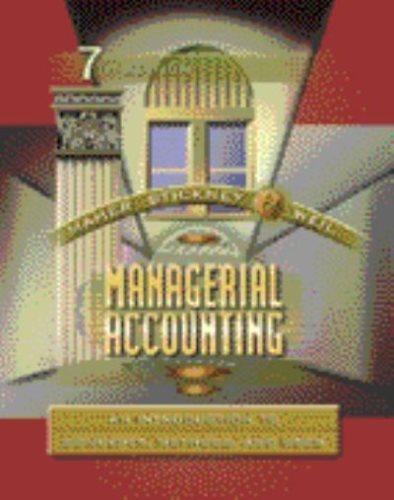Honeywell, Inc.: Relative performance evaluation.4 A major issue in divisional performance evaluation is the process companies use
Question:
Honeywell, Inc.: Relative performance evaluation.4 A major issue in divisional performance evaluation is the process companies use to separate performance results that division managers can control from those that outside environmental factors cause. For instance, firms could hold division managers accountable for achieving a fixed target, independent of the performance of other divisions operating in similar product markets, or evaluate their performance relative to the performance of other divisions. The latter approach, known as relative performance evaluation, is analogous to " grading on the curve."
The Aviation and Space Controls group of divisions at Honeywell, Inc., experimented with relative performance evaluation. Honeywell is a technology-oriented company, particularly in t he Aviation anad Space Controls Business. They historically emphasize growth, customer satisfaction, and new product development. As the Aviation and Space Controls Business has become more cost competitive, with less cost-plus contracting, in recent years top management has become more interested in providing incentives to reduce costs. Honeywell has also increased its emphasis on financial measures of performance.
The firm changed incentive contracts for top management and division managers to emphasize return on investment. Aviation and Space Controls, in particular, experimented with a '"peer company analysis" to create self-reassessment of the status quo.
The strategic planning group that performed the peer group analysis first identified the business segments of 22 competitors in the aerospace and defense industry. Of these 22 competitors, 9 are prime contractors (e.g., Boeing and Lockheed), who are in aerospace and defense, but do not face the same market environment. Of the remaining 13 c ompetitors, public data were not available for two competitors, leaving 1 1 competitors that Aviation and Space Controls' managers believed faced the same market environment as they did.
Honeywell used these results initially to identify highly ranked competitors and to examine their characteristics to see what Aviation and Space Controls could do to improve its f inancial performance. Over time, the firm will incorporate these comparisons with peer companies into the evaluation of division managers' performance.
a. What are the advantages to Honeywell of using relative performance evaluation?
b. As a division manager, would you rather have your performance evaluated using relative performance evaluation ("grading on the curve") or without regard to your competitors?
Step by Step Answer:

Managerial Accounting An Introduction To Concepts Methods And Uses
ISBN: 9780030259630
7th Edition
Authors: Michael W. Maher, Clyde P. Stickney, Roman L. Weil, Sidney Davidson





